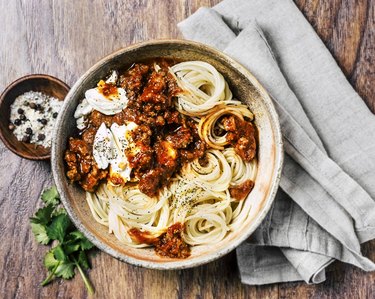
Ground beef makes a great addition to pasta, and it's not difficult to cook, although it does need careful handling. Follow these food safety tips while cooking ground beef for spaghetti, and try this Italian spaghetti recipe that pairs ground beef with tomato sauce.
Video of the Day
Video of the Day
Cooking Ground Beef for Spaghetti
The USDA Food Safety and Inspection Service (USDA FSIS) explains that ground meat, including ground beef, needs careful handling because if there is any bacteria on the surface of the meat before it is ground, grinding it causes the bacteria to spread all throughout the meat.
Escherichia coli, Salmonella, Campylobacter jejuni, Staphylococcus aureus and Listeria monocytogenes are among the harmful types of bacteria that are associated with ground beef. Known as pathogenic bacteria, these bacteria are not to be confused with spoilage bacteria, which can cause food to deteriorate in taste, smell and quality, but are not harmful to consume.
Unfortunately, you cannot see or smell harmful pathogenic bacteria, and it does not cause the food to deteriorate in any way, which is why it's important that you cook the ground beef properly and follow food safety guidelines to avoid falling sick.
Read more: What Happens If You Eat Bad Ground Beef?
The USDA FSIS recommends buying ground beef only from the refrigerated section of the supermarket and choosing only packets that feel cold and are not torn in any way. Make it your last stop in the grocery store and put it in a plastic bag so the juices don't come in contact with the other items in your cart.
Put the ground beef in the fridge as soon as you get home and use it within a day or two. If you're freezing it, wrap it in aluminum foil or a freezer bag first and mark it with the date; you should aim to consume it within four months.
You can thaw the ground beef in the fridge, or if you don't have a lot of time, you can defrost it in the microwave or under cold water. Don't leave it out on the counter to thaw, since bacteria multiplies rapidly at room temperature.
While cooking the ground beef for spaghetti, the USDA FSIS recommends using a food thermometer to ensure that it crosses a temperature of 160 degrees Fahrenheit. Avoid tasting the meat before it has crossed this temperature.
Italian Spaghetti Recipe
The Texas A&M Agrilife Extension lists a recipe that pairs ground beef with tomato sauce. While the recipe calls for penne pasta, you can substitute it for spaghetti if you're in the mood to make an Italian spaghetti recipe.
You will need:
- 1 1/3 cup of pasta (penne or spaghetti)
- 1 pound of extra lean ground beef
- 15 ounces (1 can) of unsalted tomato sauce
- 14 ounces (1 can) of low-sodium, low-fat beef broth
- 2 cups of fresh spinach
- 3/4 cup of shredded reduced-fat mozzarella cheese
- 1 1/2 teaspoons of Italian seasoning
- Salt and pepper to taste
Here's what you need to do:
- Put the pasta on to boil: Boil the pasta per the directions listed on the package.
- Brown the ground beef: While the pasta is boiling, cook the beef in a skillet over medium heat until it is no longer pink.
- Add the sauces and seasoning: Add the tomato sauce, beef broth, Italian seasoning, salt and pepper to the pan and let it come to a boil.
- Add the spinach: Chop the spinach and add it to the ground beef with tomato sauce mixture in the pan. Let it cook for a minute or two.
- Assemble and serve: Drain the water from the pasta once it has cooked and add it to the pan. Sprinkle the cheese on top and let it cook for three or four minutes, until the cheese melts. Serve hot.
According to the Texas A&M Agrilife Extension, this recipe makes six servings. Each serving supplies 260 calories, 28 grams of carbs, 27 grams of protein and 5 grams of fat.
Read more: Power Pasta Bowl with Turkey-Kale Meatballs
If you were unable to find extra-lean ground beef, North Dakota State University recommends using regular ground beef and blotting it and rinsing it with hot water to help remove up to 50 percent of the fat.
Here's how to go about it. After you've browned the beef in the skillet, transfer it to a plate lined with paper towels. Let it rest there for a minute and then blot it with more paper towels. Use paper towels to soak up the remaining fat in the skillet as well.
Then, transfer the beef to a fine-mesh colander. Place the colander on top of a large bowl. Pour 4 cups of hot water over the ground beef to rinse away the fat. Let the beef drain for five minutes. Continue with the recipe as you were.
Read more: 5 Healthy Red Meat Recipes That Satisfy